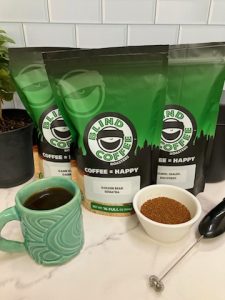Wanna know something that blows our minds? One study shows that weirdly enough, coffee pods (Keurig or Nespresso machines) are one of the most sustainable way to make hot coffee at home. And if you use the refillable or recyclable pods, it’s even more so. The reasons given are that they maintain water temperature which uses less energy, and that the cups are more concentrated and use fewer coffee grounds per cup. Truthfully, we can’t find the original study though it’s quoted all over the internet. But it does highlight some of the considerations to keep in mind when it comes to sustainability in coffee as a home barista.
Sustainability in Coffee: The obvious Some basic tips for at home coffee sustainability: Try reusable filters or pods whenever possible. Metal and cloth make great options for filters. And if you can’t do reusable, try for recyclable, or those made from recycled materials. Ditch the bag and refill your beans in a jar. If you live close to our Hillsboro cafe, you can pick up our beans in bulk. Otherwise, choose coffee in bags that can be composted or recycled. When it comes to coffee growing methods, organic is typically the most sustainable option. Some other things to look for are Shade Grown coffees, which use less water for irrigation, and Bird Friendly, which preserves habitats by growing coffee alongside other plants rather than tearing down a forest to make a coffee plantation. Certain kinds of coffee processing are more sustainable than others. Natural process coffees are sun dried with the fruit still on the coffee bean. They use less water, which makes them more sustainable in dry climates. On the other hand, wet hulled coffee from Sumatra is more sustainable for that area because of seasonal rains. Only grind what you need to prevent waste. Consider composting used grounds. Or give them a second life by making sugar scrubs, soaps, natural dyes, or any number of things Pinterest may suggest. Other considerationsChanging water temperature involves using energy. Some coffee makers, like Keurigs, maintain a consistent water temperature so that they use less energy per cup. If you need to heat water every time you make coffee, try to only heat the amount of water that you need. Or give cold brew a try. Just let it brew on your counter for 8 or so hours and then store in the fridge. Look for coffees that are direct trade or fair trade, and other fair labor practices. Sustainability includes those who grow the coffee. Livable wages means a life they can sustain. Direct trade often means that coffee growers have a say in the selling price so they are able to remain profitable. Consider how far the coffee has to travel to get to you. Choose a durable, high quality brewer to avoid having to replace it often. If you use dairy or non-dairy creamer, the same sustainability considerations apply. Consider organic and sustainably farmed options where workers are paid good wages. We know this is so much to think about! We’re not here to police your coffee because however it tastes good to you is the right way to make it. And we also believe that small choices can have a big impact. At BCR, we do our best to find organic, direct trade coffees to serve you, and we want to keep bringing you fantastic coffees for decades to come. Here’s to our beautiful world and sustainability in coffee! | 
